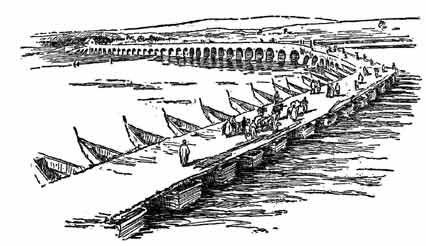 |
The attempt by the Persians to launch a punitive attack on Athens in 489 B.C. had failed when Datis and his expeditionary force were defeated at Marathon by the Athenians and their ally Plataea..
The disastrous expedition to Greece in 490 BC that ended at Marathon
made Darius even more eager not just to punish Athens but to conquer all
of Greece. For three years, after the battle of Marathon, he prepared a vast
army, but a revolt that broke out in Egypt postponed an early expedition and in
485 BC, he died. His son, Xerxes, succeeded him to the throne.
Within a year, he crushed a rebellion in Egypt and started preparations against
Greece, on a massive scale. For four years, provisions of all kinds and army
were assembled at the plains of Kapadokia, as well as food dumps along his route
to the coast of Thrace. A ship canal was opened in Chalkidiki, north of mount
Athos, large enough for two triremes, in order to avoid the dangerous cape,
which had destroyed his fleet in 492 BC. He also built a bridge on the river
Strymon.
 |
Xerxes sent emissaries to all the Greek cities demanding submission "earth and water", The Spartans threw them down a well telling them to find what they wanted at the bottom.
Athens and Aegina had been at war for some time. Aegina was one of the
strongest naval powers at this time and her ships were ravaging the Attic
coast.
When Aegina gave "earth and water", the Athenians asked the
intervention of Sparta, accusing the Aeginitians that they had betrayed the
cause of Greece. King Cleomenes seized ten leading Aeginitian citizens and
transferred them to Athens, as hostages. After this episode, Aegina ended
their hostilities against Athens.
In Greece, the news for the Persian expedition had long been known. A council of the Greek cities was summoned to meet at Corinth in 481 BC with Sparta presiding. There was considerable argument: some states did not want to put their forces under Spartan command, Athens, despite its growing naval power, was willing to put its navy under the command of a Spartan admiral Sparta while naturally a Spartan king would command the land forces.
At the end of 481 BC, all the Persian preparations for the expedition had been completed and in the following year 480 BC, after the spring rains, the vast army marched towards the Hellespont. For seven days and nights the army crossed over to Europe. According to Herodotos, the force including the attendants, was exceeded five million men and the Persian fleet numbered to 1207 ships. The vast army was consisted from 1,700,000 foot soldiers, 80,000 cavalry and 20,000 Lybians and Arabians, with chariots and camels. Thracians and Macedonians and cities of the northern Greece contributed more than 300,000 men. More probably Xerxes had no more than 200,000 troops but even were many more than the 40,000 hoplites and 366 ships that Greece could gather together. They reached Thessaly in 480 BC, without any resistance.
The Greeks knew that they were vastly outnumbered and based their
strategy on this. It was obvious that the natural aspects of Greece had to be
used as much as possible. The plan was to trap the Persian army in a
mountain-pass where its numeric advantage was of less account, and where the
Persian fleet could not launch any attacks in the back of the Greeks. Then maybe
the fleet could be destroyed in a sea-strait where the more manoeuvrable trireme
had an advantage over the less mobile Persian fleet. Once the Persian fleet was
destroyed, or scattered, the Persian land forces would be cut off from all
supplies and forced either to retreat or to starve.
The first choice for a defensive line was the gorge of Tempe and 10.000 hoplites
were sent to it. Closer inspection learned that the pass could be turned. Two
other lines remained: the pass of Thermopylae where the fleet could block the
adjacent north-Euboean strait, or the Isthmus of Corinth with a fleet at the
north of Salamis. Sparta was far from optimistic about the first plan and made
plans to retreat to the Isthmus.
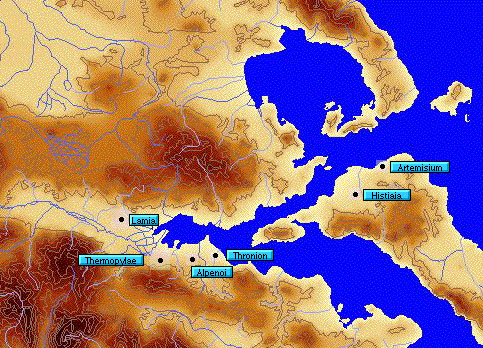 |
Athens demanded that the defences would be formed at Thermopylae as otherwise Attica would easily fall in the hands of the Persians. The Spartan king Leonidas set off with 300 picked hoplites and positioned himself with 7000 allied forces in the narrow pass in 480 BC, while the fleet guarded the sea approaches at Artemesium The battle at sea remained indecisive, but Leonidas and his '300' held the pass at Thermopylae for two days before on the third they were surrounded and killed thus fulfilling the oracle that said Sparta or one of its kings would fall.
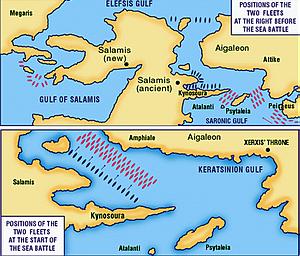 |
After Thermopylae and Artemesium, Xerxes' forces plunder Phocis and Euboea. The Boeotian cities including Thebes submitted to Xerxes. The Greek land forces plan to make a stand at the Isthmus leaving Attica undefended. The Athenians evacuate Athens and go to the island of Salamis leaving a small garrison on the acropolis. The Persians have their revenge taking and burning Athens. However three weeks later at the end of September 480 BC the Persian fleet is heavily defeated in the straits between Salamis and the mainland.
Xerxes decides to withdraw from Greece,
He leaves his brother-in-law Mardonius behind with smaller army, Herodotus says 300,000 but probably not more than 90,000. He winters in Thessaly and attempts to win over Athens through the offices of Alexander, king of Macedonia. Mardonius moves south again forcing the Athenians to abandon their city a second time. The Athenians send envoys to Sparta to mobilize, the Spartans however were already marching against 'the strangers'. News of the mobilization of the Peloponnesian army of c. 38,000 under Pausanias, regent for Leonidas' young son is passed to Mardonius by the Argives (Argos was not likely to let loyalty to Greece rob her of a chance to cause trouble to Sparta), after occupying Athens, he withdraws into southern Boeotia where he is joined by the Boeotians. Attica is not good cavalry country and is a peninsula with limited access.
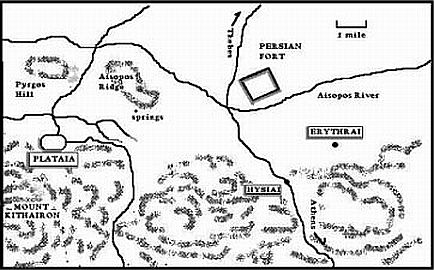 |
He sets up a stockade just north of the Asopus river. The Greeks come in over the Eleutherae pass assemble in the foothills of Mt. Kithairon at Erythrae. After several days of stalemate, Pausanias moves the Greek army west near Plataea. Where by the Dorian spear if not much Dorian brain completed the destruction of a Persian army lacking Spartan skill but not lacking Spartan courage.
Thebes was successfully besieged and deprived of the presidency of the Boeotian League, and an attempt by the Spartans to expel it from the Delphic amphictyony was only frustrated by the intercession of Athens.
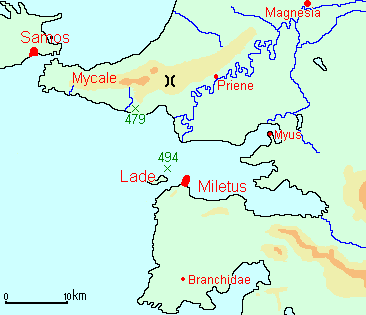 |
In the same year Samos revolted and King Leotychides II of Sparta led a small Greek fleet to guard the Cyclades against Persia. The Samians and Chians convinced him to attack the Persians, who had drawn their ships up on the beach at Mycale near Samos. In the ensuing battle the Persian fleet was destroyed.
In two seasons of fighting under Sparta, the Greeks had destroyed a Persian fleet and a Persian army, had cleared the mainland and the Aegean and most of Thrace and the coast of Asia Minor of the invader. yet within ten years the league had broken up and Sparta had relegated herself to domestic policies.
Sparta's refusal to follow up the success in Asia contrasted with Athens' energetic building of a new anti-Persian league. This is partly true, Sparta could have made her nominal control at sea into a reality or could leave the sea to Athens and consolidate and extend her land power while Boeotia and Thessaly were confused and weak or thirdly Sparta could consolidate her unsettled position in the Peloponnese created by Cleomenes. By doing nothing but waver Sparta surrendered the field and the goodwill to Athens to turn the league into an empire and sow the seeds of a conflict to come in which victory would come at a price of supping with the 'strangers' and not having the goodwill of Greece to fall back on when the bubble finally burst.
Pausanias, victor of Plataea stood for the first and in 478 in a brilliantly successful campaign captured Byzantion and Cyprus but by 477, Pausanias' tyrannical behaviour has made him unpopular with the liberated Greeks and was recalled to Sparta. His replacement, Dorcis, was unable to maintain control of the liberated Greeks who now following the lead of Athens. Leotychides the champion of the second is accused of bribery; recalled and exiled in Tegea in 476.